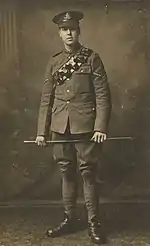Bombardier (rank)
Bombardier (/ˌbɒmbəˈdɪər/) is a military rank that has existed since the 16th century in artillery regiments of various armies, such as in the British Army and the Royal Prussian Army. It is today equivalent to the rank of corporal in other branches.[1] The rank of lance bombardier is the artillery counterpart of lance corporal.

_by_Nikolai_Zaretsky_1911.jpg.webp)
Commonwealth armies
Bombardier (Bdr) and lance bombardier (LBdr or L/Bdr) are used by the British Army in the Royal Artillery and Royal Horse Artillery. The same applies to the Royal Australian Artillery, the Royal New Zealand Artillery, the South African Army Artillery and the Armed Forces of Malta. The Royal Canadian Artillery uses the ranks of master bombardier and bombardier, corresponding to master corporal and corporal.
Originally, the Royal Artillery had corporals, but not lance corporals. Unlike a lance corporal, a bombardier held full non-commissioned rank and not an acting appointment. The rank was equivalent to second corporal in the Royal Engineers and Army Ordnance Corps.
In 1920 corporals were abolished in the Royal Artillery; bombardiers became the equivalent and acquired the normal two chevrons.
The rank of lance bombardier originated as acting bombardier, an appointment similar to lance corporal and was also indicated by a single chevron. The appointment was renamed lance bombardier in February 1918 and became a full rank, as did lance corporal, in 1961.
See also
- British Army Other Ranks rank insignia
- Comparative military ranks
- Canadian Forces ranks and insignia
References
- Oxford dictionary. "Bombardier". Retrieved 19 August 2012.
External links
 Texts on Wikisource:
Texts on Wikisource:
- "Bombardier". New International Encyclopedia. 1905.
- "Bombardier". Encyclopædia Britannica (11th ed.). 1911.